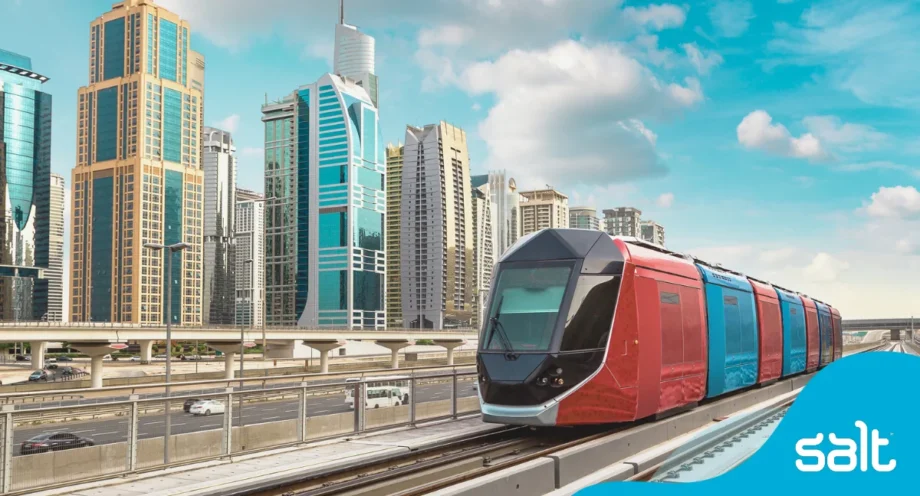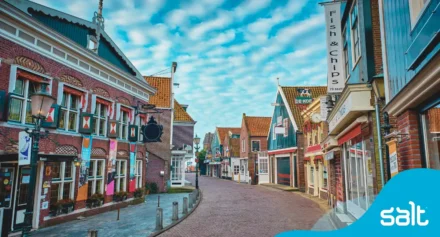Dubai relocation guide
Whether you're hiring in Dubai or planning a move for your career, this city has successfully transformed into a global hub offering an abundance of new business opportunities.

Dubai has successfully transformed into a global city offering an abundance of new business opportunities, as well as becoming an attractive expat haven, due to being tax-free. There are countless reasons why Dubai is a fantastic place to relocate to, but we have whittled it down to compile a list of the top 10.
A thriving economy, great quality of life and fantastic job opportunities make Dubai a popular destination for talented digital experts from around the world. Could you see yourself moving to the ‘City of Gold’?
5 reasons to move and work in Dubai
1. Live the high life
Dubai ranks among the world’s top cities for quality of life.
2. Year-round sunshine
Temperatures rarely dip below 20°C, making it ideal for outdoor living and leisure activities.
3. A truly cosmopolitan city
With over 200 nationalities calling Dubai home, the city offers a rich tapestry of cultures and cuisines. Expatriates make up more than 80% of the population, creating a vibrant international community.
4. A world of flavours
Dubai’s culinary scene reflects its diverse population, offering a wide array of international cuisines. From street food to fine dining, there’s something to satisfy every palate.
5. Superb connectivity
Dubai International Airport (DXB) serves as a hub for over 100 airlines, connecting the city to 340 destinations worldwide. Emirates Airlines offers numerous direct flights, making travel convenient.
Living in Dubai: key facts you should know
City overview
- Population: Approximately 3.95 million
- Metro Area Population: Around 6.05 million
- Metro Area Size: Approximately 1,579 km²
- Time Zone: Gulf Standard Time (GST), UTC+4
- Currency: United Arab Emirates Dirham (AED)
- Government: Federal absolute monarchy under the UAE; Dubai is one of the seven emirates
Food and drink scene
Supermarkets are reasonably priced. However, imported branded products are known to be a bit pricier. Expats tend to be spoiled for choice in Dubai, with several malls offering international brands alongside local shopping boutiques. Several supermarkets from France, the UK, India, and the USA can be found across the Emirate. Eating out in Dubai is generally affordable, and there is a range of restaurants to choose from.
Diversity and Equality in Dubai
Dubai continues to advance gender equality in the workplace, aligning with national policies that guarantee equal rights for men and women.
UAE’s commitment to gender equality
- Constitutional rights: The UAE Constitution ensures equality before the law in areas such as property, education, health, inheritance, and employment.
- Equal pay legislation: A 2020 law mandates equal pay for men and women performing the same work, covering both public and private sectors.
- Leadership representation: A 2025 mandate requires all private joint-stock companies to appoint at least one woman to their boards, building on earlier requirements for public companies.
- Gender balance council: Reorganised in 2025, the council promotes gender balance across all sectors and supports contributions from both men and women.
Why it matters for talent and employers
-
The work culture in Dubai
The work culture in Dubai is often described as ‘work hard, play hard,’ with Friday being the weekly day of rest. Many companies choose to work from Sunday to Thursday, with Friday and Saturday nominated as their official weekend. During the holy month of Ramadan, working hours are reduced to no more than six hours on a working day.
While Arabic remains the official language of the UAE, English is widely spoken in business, and around 99% of companies now conduct operations in English to accommodate the multitude of cultures presently living in the city.
-
Getting around Dubai
If you’re looking for comfort and convenience while travelling around the city, a great option to consider is their public transport services. This includes the metro as well as tram, buses and local taxis. Private cars are also an option and can be easily rented or bought.
The Dubai Tram is a great transport choice and perfect for exploring areas such as Al Sufouh, Jumeriah Beach Residence and the Dubai Marina.
-
Can you afford to live in Dubai?
Dubai remains one of the more expensive cities globally, with the cost of living often higher than in many Western cities. Rent, dining, and transport can add up quickly, particularly given the wide range of lifestyle options and activities on offer. While the city offers luxury at every turn, budgeting is essential to make the most of life in Dubai.
Dubai’s tax structure is relatively light, with no income tax and a standard VAT rate. This makes some aspects of daily living more manageable, but it’s still important to plan for housing, schooling, and leisure to enjoy everything the city has to offer.
-
Safety in Dubai
Dubai maintains an outstanding record of safety and security, consistently ranking among the safest cities globally. Crime rates remain extremely low, supported by strict laws and effective enforcement.
Employment continues to be a key requirement for residency, contributing to social stability and low unemployment. Combined with advanced surveillance and public safety measures, Dubai offers residents a secure environment unmatched by many other major international cities.
-
Banking and money for newcomers to Dubai
As of 2025, the UAE Dirham (AED) remains the official currency of the United Arab Emirates, and Dubai continues to offer a robust and modern banking environment. The banking sector in Dubai is well-developed.
For non-residents, opening a bank account in Dubai is feasible but typically involves certain requirements. While options are more limited compared to residents, several major banks, such as Emirates NBD, Mashreq, ADCB, FAB, DIB, RAKBANK, and HSBC UAE, offer non-resident accounts.
To open an account, non-residents generally need to provide a valid passport, proof of address, and possibly additional documents like recent bank statements or a CV, depending on the bank’s policies.
-
Healthcare in Dubai
In Dubai, health insurance is mandatory for all residents and expats living in Dubai. Employers are required to provide health insurance for their employees, while sponsors are required to provide access to healthcare systems for their resident dependents. UAE medical insurance prices vary and are dependent on the type of cover you choose.
Travel insurance is advised for non-EU residents as it will help to cover any additional expenses incurred for an ambulance service or repatriation costs.
There are a few public hospitals which offer free or low-cost services to Dubai residents. You’ll need to have a health card to receive treatment at one of these hospitals, which is available from the Department of Health and Medical Services.
-
Visas for working and living in Dubai


